
Sid Meier's Civilization computer game seems ripe for conversion into a board game. The PC game is, after all, basically just a computerized board game that plays out on a grander scale. Sid himself was inspired by many classic board games, including Risk and Axis & Allies. Fantasy Flight has already taken a stab at trying to distill the core mechanics of Civ down into a digestible board game when they released Sid Meier's Civilization: the Board Game back in 2010. I really like that game, even though it is a bit bloated and unwieldy. Attempting to directly translate Civ's mechanics down into board game form unsurprisingly results in a fairly complicated game that takes a very long time to learn and play.
Fantasy Flight's approach this time around seems to be to develop an elegant board game, and then apply the Civilization license onto it. The result is a board game that feels much more distant from the computer game, but which plays much more smoothly as a board game.
Civilization, streamlined
Perhaps the biggest problem with the older Civilization board game is the game length and amount of downtime. Games could run for over five hours, and the fact that each player resolved their entire turn phase (city management or army movement) before moving onto the next player meant that you could end up sitting for 20 to 40 minutes, twiddling your thumbs and waiting for other players to resolve their turns. That is one of my biggest peeves with a lot of epic games: too much downtime.
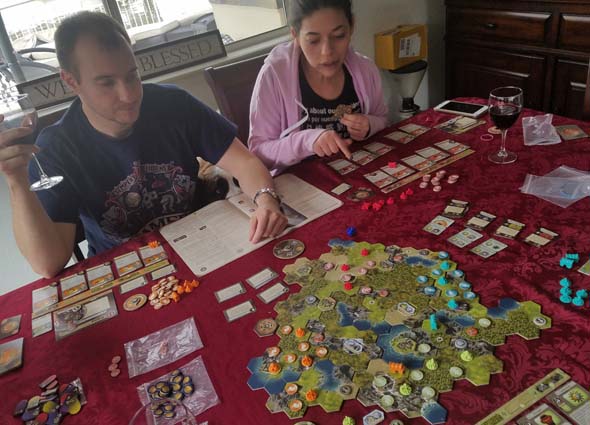
A New Dawn is a very elegant game.
A New Dawn addresses that problem by having each player take only a single action in each of their turns. There are no phases; just take an action from your focus bar and then move on to the next player. Turns, therefore, are very quick, turnaround time is very short, and the game moves along at a rapid pace. This, ironically, serves to better maintain the "one more turn" addictive nature of the computer game. You might find yourself neglecting bathroom breaks for several turns because things are moving along so swiftly. Your turn is generally quick enough that you want to finish it before you step away or take a break, and other players' turns are so quick that you don't want to step away because you know it'll be back around to your turn in a few minutes.
Longer games with longer turns and more downtime can also often result in players outright forgetting what they were planning on doing by the time the turn gets back around to them. Either that, or the large amounts of moves and actions that the other players take changes the game state so much that, when your turn comes around, the thing you were planning on doing is no longer ideal -- if it's even possible.
That's rarely a problem in A New Dawn because each player does one thing on their turn, so the state of the board isn't radically changing between your turns. It's much more of a gradual change. That doesn't mean that other players can't disrupt your plans; they certainly can, especially when combat between players starts happening. It just means that you aren't going to be sitting there bouncing up and down in your chair waiting to pull off a spectacular move, only to have another player blow up all your plans at the last minute and leave you spending far too long wondering "What the heck do I do now?" when your turn starts... [More]
67fd088c-265a-4a60-939d-4c4027df3179|0|.0
Tags:Sid Meier's Civilization, Sid Meier's Civilization: A New Dawn, Sid Meier's Civilization the Board Game, Fantasy Flight, Firaxis, 2K Games, board game, strategy, empire-building, focus bar, cities, world wonder, technology, culture, war, barbarians, James Kniffen

Earlier today, I served as a guest host for the Civilization podcast Polycast, episode 295. I joined regular hosts DanQ, Makahlua, MadDjinn, and TheMeInTeam. The episode covered a handful of topics, ranging from the new religion mechanics introduced by the fall 2017 patch, to a proposal for athletes to be a type of great person, the new Civilization: A New Dawn board game, to the issue of micro-transactions (or "Recurrent Consumer Spending" as Take-Two Interactive CEO, Strauss Zelnick calls it), and more.
If you missed the live broadcast, then the edited archive version will be released on PolyCast's website next Saturday (December 2). I'll update this post with a link once the archive is updated.
"Recurrent Consumer Spending"
"Recurrent Consumer Spending" was one of the primary topics of the previous episode (PolyCast #294), and so we discussed it again as part of a discussion on feedback from last week's episode. Micro-transactions (and loot boxes in particular) are a hot topic in gaming of late, especially after the fiasco that was EA's launch of Star Wars: Battlefront II. Games pundit Jim Sterling has made micro-transactions an almost weekly issue in his Youtube podcast The Jimquisition. Sterling has been comparing loot boxes to gambling for months, and recently, some European regulatory agencies have started to evaluate whether loot boxes should legally be classified as a type of gambling. As someone who has previously worked for a gambling company, I am aware of how compulsive impulses are used to keep gamblers addicted to a particular game, and I definitely believe that the current implementation of loot boxes in games like Shadow of War, Call of Duty, and Star Wars: Battlefront does try to capitalize on those same addictive impulses, and so should probably be regulated similarly to gambling. I don't want micro-transactions in my games at all, but I don't necessarily think that such things should be illegal per se. But they should be regulated, and I do think that the game boxes should clearly indicate to parents that the game includes "gambling-like elements" (or some other warning).
Jim Sterling has been making a fuss about micro-transactions and loot boxes for months.
WARNING: May not be appropriate for younger or more sensitive viewers.
More importantly (for me), however, is the concerns for what micro-transactions do to the actual game. Just last night, I spent something like 4 hours in Shadow of War grinding my character and orc captains up to a point that I could siege the castle in Act II. I played every side mission available in the chapter, and then still had to do some Nemesis missions, in order to get Talion up to level 20 and unlock the ability to assign a third uruk captain to my siege assault. That third captain was essential to get my siege level up above the level of the defenders. I'm not sure if that was necessary, but I didn't want to risk having my captains killed during the attack. I actually happen to really like Brûz The Chopper, so I didn't want him dying because my siege was under-leveled. This is just Act II! I can't imagine how grindy the game might become during the later acts! And all this extra grind in the campaign is a direct result of the inclusion of the game's War Chest (i.e. loot boxes). You can spend real-life money to buy random orc captains to use in your sieges or to defend your captured forts. So the whole game is balanced such that it's just enough of a grind to encourage people to spend money to speed things along by buying the War Chest.
Well, Take-Two CEO Strauss Zelnick has said that he wants every game in 2K's library to include "recurrent consumer spending". That would include my beloved Civilization... [More]
8f53a504-5bbb-4626-ba4a-56406fa073a4|0|.0
Tags:PolyCast, Civilization, Sid Meier's Civilization, Civilization III, Civilization IV, Civilization: Colonization, Civilization V, Civilization VI, Firaxis, podcast, DanQ, Makahlua, TheMeInTeam, MadDjinn, micro-transaction, gambling, Strauss Zelnick, Take-Two Interactive, 2K Games, Jim Sterling, Jimquisition, Middle-Earth: Shadow of War, Brûz The Chopper, board game, Sid Meier's Civilization the Board Game, Sid Meier's Civilization: A New Dawn

This past weekend, I was once again honored to be invited onto the Polycast podcast about the Civilization games. This was my third time on the show since the release of Civilization VI (back in November). Those two episodes were focused more about initial impressions of the game. This time, we got to have some more substantive discussions.
The 1-hour archive of the episode can be streamed from civcomm.civfanatics.com/polycast/polycast/season9/episode223.mp3:
This archived episode is edited down to 1 hour (from a 2-hour recording), so not all the following topics may be included in this particular episode. The remaining topics may be included in later episodes, so be sure to check back at Polycast.net if you want to hear it all!
The bulk of our discussions were focused around a handful of Civfanatics forum topics regarding criticisms and suggestions for enhancing the district mechanics. The first thread was about users' ideas for possible districts in any inevitable expansion for the game. This gave me an opportunity to link back to a previous blog that I had written about my own ideas for new districts (and other ways to make better use of the game's map). Ideas from other users ranged from new districts focused around diplomacy and envoy-generation, to railroad hub districts, a fortress / castle district, espionage district, and (of course) a canal district. Other users pitched the idea of stacking multiple districts into a single tile. This idea seemed unfavorable to the Polycast hosts (as well as myself), as it generally undercuts the fact that "unstacking" cities was a core design philosophy of Civ VI. However, it is worth pointing out that "unstacking" units was the core design philosophy of Civ V, but Civ VI added limited stacking back into the series. So back-pedaling on a philosophy of unstacking is not without precedent.
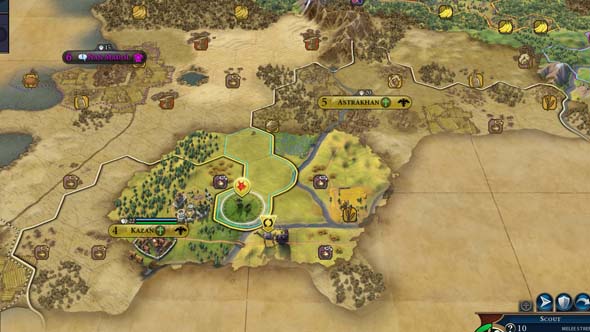
Russia is pretty much the only A.I. that places its districts well, due to its free extra border expansion.
The next topic was a thread about removing districts. The general consensus seemed to be that we were all in favor of having a city project to remove or relocate districts, if -- for nothing else -- but to relocate poorly-placed districts in captured A.I. cities. The last forum topic discussion was about user dunkleosteus' ideas about rethinking districts. I think we all agreed that the poster's ideas seemed to be far too complicated, but there are some ideas of merit in there. Having more options for further specializing districts and cities would be fine, and we'd all like to see more bonuses based on nearby districts and the map so that district placement doesn't feel quite so ... mechanical... [More]
47ec6e63-fca3-483e-8260-ed72b3b0b7f6|0|.0
Tags:Civilization, Sid Meier's Civilization, Civilization V, Civilization VI, PolyCast, Firaxis, podcast, DanQ, Makahlua, TheMeInTeam, MadDjinn

In my last post, I ranted a little bit about some of the major frustrations that I have with the way that Civilization games have historically dealt with difficulty levels. In summary, I identified three problems that I feel make it less enjoyable to play the game on higher difficulties, even if the lower difficulties still feel too easy. The three problems are:
In this post, I'd like to provide some more constructive criticism by discussing some of the thoughts and ideas that I've had for possibly resolving these three problems. These ideas include providing a wider range of options for customizing the difficulty level and game experience to suit the individual player's tastes and style, and to provide a wider (and more open-ended) set of game-long challenges.
Alternative solutions to game difficulty
So what could the developers do about these problems?
Well, the problem of game pacing could possibly be solved by inverting the handicap such that instead of speeding up the A.I.s' progress through the game, the player is slowed down. This could be accomplished by slowing down the human player's tech and civic progress, and by negatively handicapping some of the human player's yields. This would allow the A.I.s to progress at a more historically-appropriate rate, and overall game length would remain similar across all difficulties.
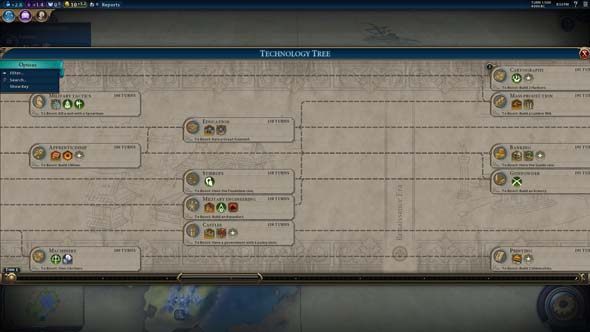
Padding out sparse areas of the tech and civics trees could mitigate the ability to beeline to later eras.
Rapid era progression could also be somewhat mitigated by padding out the tech and civics trees a little bit more. Beelining to the Renaissance via the "Cartography" technology is common for civs like England and Norway. There's a few ways to limit this. One simple way would be to simply make "Cartography" require either "Education" or "Military Tactics". Another way would be to have a technology between "Ship Building" and "Cartography" -- such as an "Optics" technology that unlocks an upgrade to the Scout, or a "Lateen Sail" technology that unlocks a medieval naval unit like the Cog, Hulk, Junk, or Galleass (or move the Caravel up to "Lateen Sails" but don't give it ocean-crossing abilities until "Cartography").
Customization, options, and difficulty settings
As for resolving the other issues presented by high difficulty levels, my preference would be for the developers to add more customization and tuning options for players so that we can tailor the gameplay experience and challenges more to our liking.

Civ VI has limited customization options.
Having independent sliders or settings for things like Player Handicaps, A.I. Handicaps, AI Temperament, Barbarian Spawn Rate, Barbarian Aggressiveness, Barbarian Tech Level, City State Aggressiveness, and so on would all go a long way towards allowing the player to customize the game's challenge according to their own strengths and weaknesses. Handicap settings for players and A.I. can even be further divided into different sub-categories along the lines of: Tech Handicap, Culture Handicap, Production Handicap, Gold Handicap, Growth Handicap, Happiness / Amenity Handicap, etc.. So if you find that you are consistently out-teching your A.I. opponents, but you feel you have parity with the A.I. in other areas of the game, then you could specifically buff the A.I.'s tech handicap, weaken yours, or both.
This would certainly make some of the game's code more complicated, but I don't think that it would be prohibitively difficult. The difficulty settings already make adjustments to these very same parameters, and I believe the game's own .ini files allow modders to customize many (if not all) of these attributes. I don't see any reason why such settings can't just be in the game's settings menu, and the difficulty settings (deity, emperor, king, settler, etc.) could just use some pre-configured arrangements of those values.
Other genres use similar paradigms for their difficulty settings. Sports games are a prime example... [More]
b6248b6f-1a24-40b9-86ea-99aa3b364e61|4|5.0
Tags:Sid Meier's Civilization, Civilization V, Civilization VI, Firaxis, strategy, grand strategy, difficulty, artificial intelligence, climate, politics, demographics, quest, Civilization: Beyond Earth, Madden NFL, NBA 2k16

Obviously, I love the Sid Meier's Civilization game franchise. I've been playing it since Civ III, and even own the Fantasy Flight board game (which I also really like). This game series has kept me up, one-more-turning, into the wee hours of the morning on many occasions. Despite my love for the games, this series can also really grind my gears sometimes.
One of my persistent frustrations with the Civilization series of games is the way that it handles difficulty levels. Granted, this seems to be a common issue in all strategy games, so Civ is certainly not unique in this frustration. Basically, the higher difficulties don't make the A.I.s play better; rather, it just gives them free stuff at the beginning of the game, and buffs their production, research, and so on. The free stuff includes (depending on the difficulty level selected): extra settlers, extra military units, free workers/builders, free technologies, extra gold, extra population in its starting city, and so forth.
There's three key problems with this design paradigm:
- It front-loads the challenge in a game that is supposed to have very long play-sessions
- It limits player options
- It rushes the pace of the game
The front-loading of frustration
Giving the A.I.s extra stuff at the beginning of the game only makes the game harder by giving the A.I.s a handicap - a head start. It doesn't make the A.I.s better - or the game harder - in the long run. The A.I.s still chose crappy locations for those extra settlers to plant their cities - often putting them in un-productive locations, or (in the case of Civ VI) putting them so close together that they can't fit enough districts in. The A.I. doesn't plan ahead regarding where its districts will be, and it often places those districts in sub-optimal locations. "Sub-optimal" being an understatement.
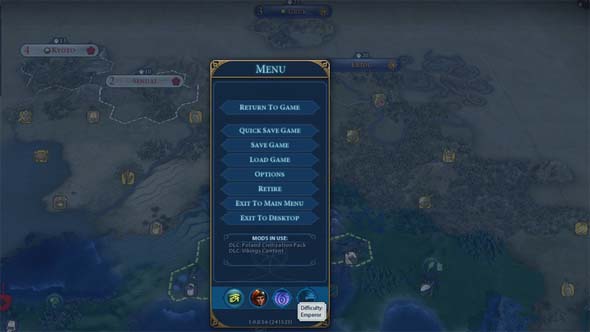
The A.I. starting with extra settlers on high difficulties doesn't make the game harder in the long run.
Those free extra units aren't used more effectively either. Even with a few extra warriors, the A.I. still can't plan or execute a city siege, as it's generally inept at handling the one-unit-per-tile, hex-based combat, and they rarely bother to escort their civilian units. The developers can't be completely blamed for this, as A.I. for tactical combat is a very difficult problem to solve. Most games that have A.I.-driven tactical combat either don't have any grand strategy at all (as in Panzer General), or the grand strategy is separated into a completely different layer of gameplay (as in Total War).
Once the human player can get his or her cities up and running, get a sizable military built, and start conquering the A.I., all these free starting units become moot. These extra units can even backfire. A.I. cities can usually easily be captured by the human player. Since the A.I. gets buffs towards population growth, production, and other yields, those cities tend to grow faster than the player's cities anyway. So if they're conquered, then the human player gets better cities than they could have founded on their own, and gets them sooner than if they had spent the time to build their own settlers.
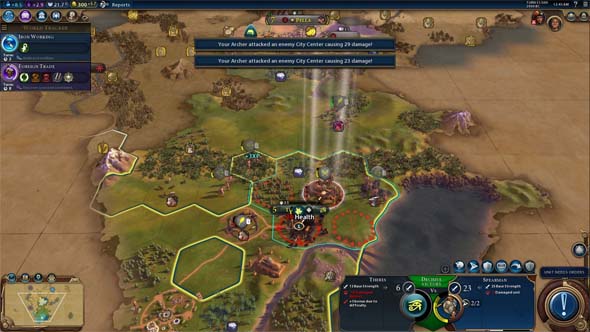
It's not hard to capture A.I. cities, which are often larger and more developed
than any city the player could have founded within the same amount of time.
These early hurdles aren't that difficult to overcome, and once the A.I.'s starting advantages have been neutralized, they don't pose much of an increased threat long-term... [More]
a8515e12-0c08-4e01-a801-df49acf76d91|5|5.0
Tags:Sid Meier's Civilization, Civilization V, Civilization VI, Firaxis, strategy, grand strategy, difficulty, tactics, artificial intelligence, hex, handicap, wonder, eras, technology
|

| 12 | | | | | | | 60 | | 11 | | | | | | | 55 | | 10 | | | | | | | 50 | | 09 | | | | | | | 45 | | 08 | | | | | | | 40 | | 07 | | | | | | | 35 | | 06 | | | | | | | 30 | | 05 | | | | | | | 25 | | 04 | | | | | | | 20 | | 03 | | | | | | | 15 | | 02 | | | | | | | 10 | | 01 | | | | | | | 05 |
|